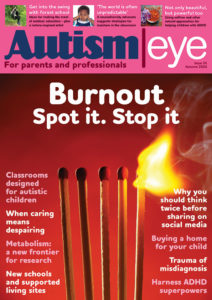Epilepsy campaigners have criticised the UK Government for excluding the condition from its new strategy on tackling major health problems.
Epilepsy is one of the most common co-occurring health conditions among people with autism and learning disabilities.

Daniel Jennings, campaigns manager for Epilepsy Action, fears epilepsy services will get left behind because the Government has not included the condition in its new health strategy
Charity Epilepsy Action argues the Government’s failure to mention epilepsy in its major conditions strategy means it is not a priority.
High incidence of autism and epilepsy
Studies have suggested anywhere between two and 46 per cent of people on the autism spectrum also have epilepsy. A large US study published in 2019 that looked at almost 7,000 autistic children suggested around 10 per cent have the brain disorder.
Those with autism who also have a learning disability are more at risk of epilepsy, research shows.
And research suggests that around 22 per cent of people with a learning disability also have epilepsy.
Six health conditions included
The Government says six health conditions are responsible for 60 per cent of all early deaths and illnesses. These are the ones it says it has included in its strategy.
The six conditions are cancer, respiratory or breathing problems, dementia, cardiovascular or conditions linked to the heart and blood, musculoskeletal disorders and mental health problems.
Daniel Jennings is a senior policy and campaigns manager with Epilepsy Action. He said epilepsy services will not get the same level of “input or improvement” as the conditions included in the Government’s strategy.
But epilepsy services are already “understaffed and under-resourced”, he said.
Request rejected
Led by Epilepsy Action, campaigners included a number of charities, who wrote to health secretary Steve Barclay. They requested an amendment to the strategy “to include neurology as a seventh priority, with a particular focus on epilepsy”.
In response, Health Minister Will Quince told the charities the Government was focusing on dementia instead. This was because dementia is the “leading cause of death in women and the second biggest cause of death for men”.
Related:
- Many autistic teens develop bad health
- Mum champions medical cannabis
- Epilepsy may be treated with supplement
- Drug may stop seizures leading to autism
Published: 21 September 2023
















